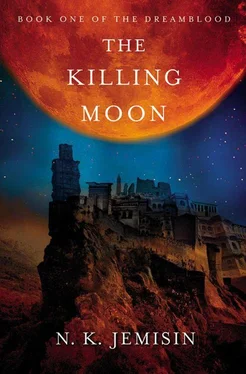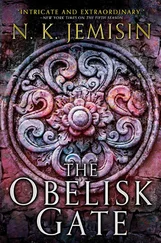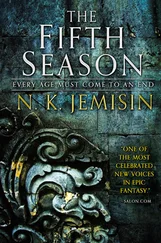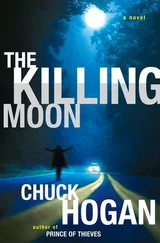With some concern he saw that Dreaming Moon had reached zenith, her bright expanse glaring from the sky’s center like a great striped eye; the night was half over. Faster to cross this part of the city on the ground than by rooftop. After a moment’s pause to turn his loindrapes and don several gold ear-cuffs—for not even the poorest man in Gujaareh’s capital went without some ornamentation—Ehiru left the old wall and walked the streets as a man of no particular caste, nondescript in manner, taking care to slouch in order to lessen his stature. At such a late hour he saw only caravanners, making the final preparations for a journey on the morrow, and a yawning guardsman, doubtless headed for a night shift at one of the city gates. None of them noticed him.
The houses became less dense once he reached the highcaste district. He turned down a side street lit poorly with half-burned-out lanterns, and emerged amid a gaggle of young shunha men who reeked of a timbalin house and a woman’s stale perfume. They were laughing and staggering together, their wits slowed by the drug. He trailed in their wake for a block before they even marked his presence and then slipped aside, down another side street. This one led to the storage barn of the guesthouse he sought. The barn doors stood open, barrels of wine and twine-wrapped parcels in plain view along the walls—unmolested; Gujaareh’s few thieves knew better. Slipping into the shadows here, Ehiru removed his show-jewelry and turned his drapes once more, rolling and tying them so they would not flap. On one side, the drapes bore an unassuming pattern, but on the other—the side he wore now—they were completely black.
The day before, Ehiru had investigated the guesthouse. As shrewd as any merchant-casteman, the house’s proprietor kept his tower open year-round to cater to wealthy foreigners, many of whom disliked relocating during the spring floods. This tithebearer—a northern trader—had a private room in the tower, which was separated from the rest of the building by a flight of steep stairs. Convenient. Hananja made way when She wanted a thing done.
Within the house, the kitchen was dim, as was the serving chamber beyond. Ehiru moved past the table with its low cushions and through the house’s atrium garden, slowing as he turned aside fronds of palms and dangling ferns. Beyond the garden lay the sleeping chambers. Here he crept most stealthily of all, for even at such a late hour there could have been guests awake, but all of the rooms’ lanterns remained shuttered and he heard only slow, steady breathing from each curtained entrance. Good.
As he climbed the tower steps, Ehiru heard the trader’s unpeaceful snores even through the room’s heavy wooden door. Getting the door open without causing its hinges to creak took some doing, but he managed it while privately damning the outland custom of putting doors on inner chambers. Inside the room, the trader’s snores were so loud that the gauze curtains around his bed shivered in vibration. No wonder the proprietor had offered him the tower, and probably discounted the room. Still, Ehiru was cautious; he waited until a particularly harsh snort to part the curtains and gaze down at his next commission.
This close, the scent of the man mingled rancid sweat, stale grease, and other odors into a pungent mix that left Ehiru momentarily queasy. He had forgotten the infrequent bathing habits of people from the north. Though the night was cool and breezy, the northerner—a trader from the Bromarte people, the commission had specified, though in truth Ehiru had never been able to tell one northern tribe from another—sweated profusely, his pale skin flushed and rash-prickled as if he slept in high noon’s swelter. Ehiru studied that face for a moment, wondering what peace might be coaxed from the dreams of such a man.
There would be something, he decided at last, for Hananja would not have chosen him otherwise. The man was lucky. She did not often bestow Her blessings upon foreigners.
The Bromarte’s eyes already flickered beneath their lids; no jungissa was necessary to send him into the proper state of sleep. Laying fingers on the man’s eyelids, Ehiru willed his own soul to part from flesh, leaving its connection—the umblikeh—tethered in place so that he could follow it back when the time came. The bedchamber had become a shadow-place, colorless and insubstantial, when Ehiru opened his soul’s eyes. A reflection of the waking realm, unimportant. Only one thing had meaning in this halfway place between waking and dreaming: the delicate, shimmering red tether that emerged from somewhere near the Bromarte’s collarbones and trailed away into nothingness. This was the path the man’s soul had taken on its journey to Ina-Karekh, the land of dreams. It was a simple matter for Ehiru to follow the same path out and then in again.
When he opened his soul’s eyes this time, color and vast strangeness surrounded him, for he was in Ina-Karekh, the land of dreams. And here the dream of the Bromarte revealed itself. Charleron of Wenkinsclan, came the name to Ehiru’s consciousness, and he absorbed the name’s foreignness and as much as he could of the person who bore it. Not a soulname, but that was to be expected. Bromarte parents named their children for the hopes and needs of the waking world, not protection in sleep. By the reckoning of this Charleron’s people, his was a name of ambition. A name of hunger . And hunger was what filled the Bromarte’s soul: hunger for wealth, for respect, for things he himself could not name. Reflected in the dreamscapes of Ina-Karekh, these hungers had coalesced into a great yawning pit in the earth, its walls lined with countless disembodied, groping hands. Assuming his usual dreamform, Ehiru floated down through the hands and ignored their silent, scrabbling, blind need as he searched.
And there, at the bottom of the well of hands, weeping with fear and helplessness, knelt the manifestation of the unfortunately named Bromarte man. Charleron cringed between sobs, trying and failing to twist away from his own creations as the hands plucked at him again and again. They did him no harm and would have been only moderately frightening to any properly trained dreamer—but this was nevertheless the bile of dreams, Ehiru judged: black and bitter, necessary for health but unpleasant to the senses. He absorbed as much of it as he could for the Sharers, for there was much of use in dreambile even if Charleron might not agree. But he reserved space within himself for the most important humor, which after all was why he had come.
And as they always did, as the Goddess had decreed they must, the bearer of Hananja’s tithe looked up and saw Ehiru in his true, unadulterated shape.
“Who are you?” the Bromarte demanded, distracted momentarily from his terror. A hand grabbed his shoulder and he gasped and flinched away.
“Ehiru,” he said. He considered giving the man his soulname and then decided against it. Soulnames meant nothing to heathens. But to his surprise, the Bromarte’s eyes widened as if in recognition.
“ Gualoh ,” the Bromarte said, and through the filter of their shared dream, a whiff of meaning came to Ehiru. Some kind of frightening creature from their nightfire tales? He dismissed it: barbarian superstition.
“A servant of the Goddess of Dreams,” Ehiru corrected, crouching before the man. Hands plucked nervously at his skin and loincloth and the twin braids that dangled from his nape, responding to the Bromarte’s fear of him. He paid them no heed. “You have been chosen for Her. Come, and I will shepherd you to a better place than this, where you may live out eternity in peace.” He extended his hand.
The Bromarte leaped at him.
The movement caught Ehiru by such surprise that he almost failed to react in time—but no common man could best a Gatherer in dreaming. With a flick of his will, Ehiru banished the well of hands and replaced it with an innocuous desert of wind-waved dunes. This afforded him plenty of room to sidestep the Bromarte’s headlong rush. The Bromarte ran at him again, roaring obscenities; Ehiru opened and then closed the ground beneath the Bromarte’s feet, dropping him to the waist in sand.
Читать дальше












